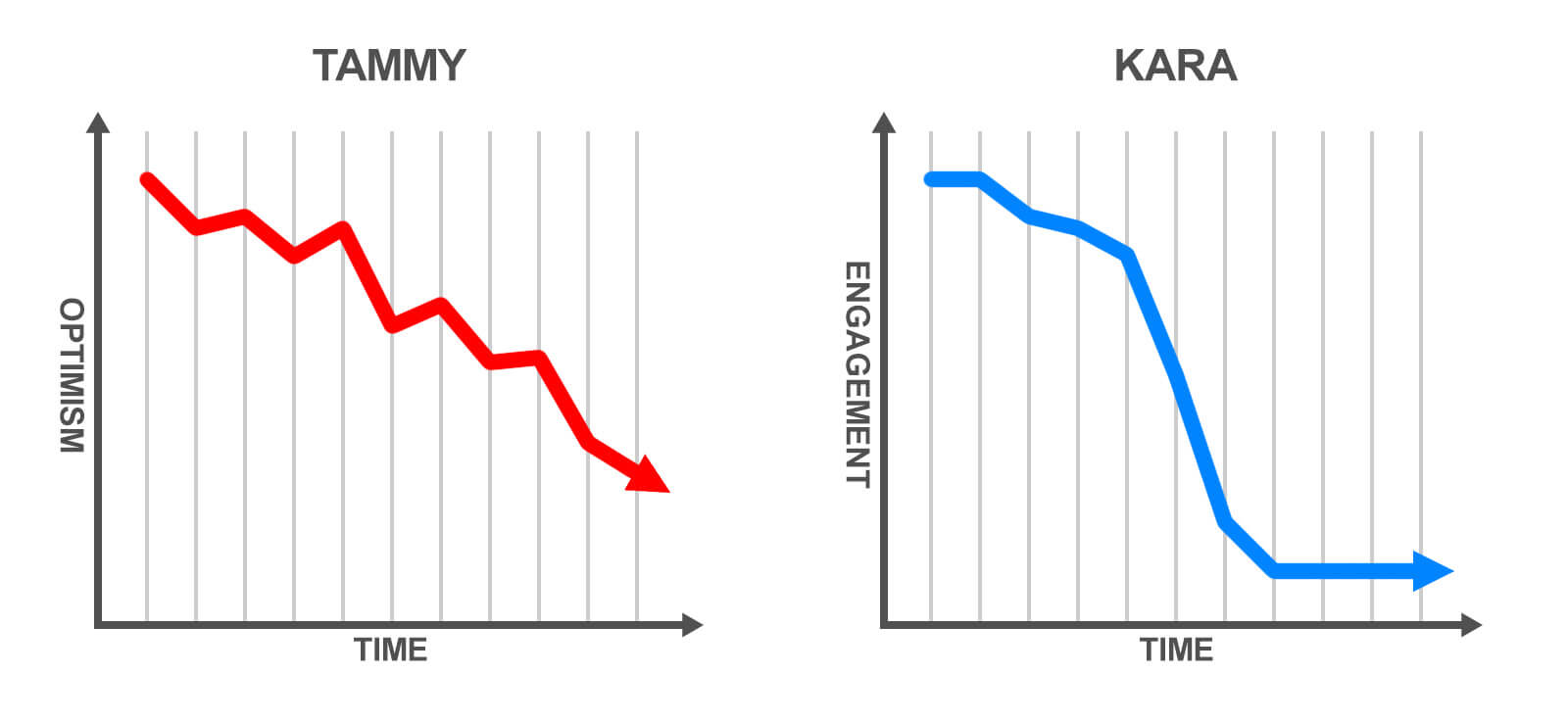Act I: The parable
Tammy waited in her car and sipped on a cup of coffee. To say she was excited would be an understatement, but perhaps nervous would be a more appropriate term. She’d been waiting for half an hour in her car to the parking lot of a rather non-descript office building.
She didn’t have to get there that early, but she wanted to make sure she wasn’t late on her first day.
At 8:55, she took a last sip of her coffee and put it in the cup holder before getting out of the car.
That morning was filled with the typical first-day type paperwork. Her boss, Kara, showed Tammy to her new desk. She liked to mention her “open door policy” — something that always brought a chuckle since they worked in an open office workspace.
“A little more seriously,” Kara said. “Any questions, I’m right here.”
She encouraged Tammy to take advantage of their proximity to ask as many questions as she wanted while she got up to speed. That evening, Tammy went home and posted a photo of her new desk to Instagram with the caption: Love my new job!
At first, things seemed too good to be true. Everyone was very nice and helped answer her questions — and she had plenty those first few weeks.
Then, slowly, cracks started to appear.
Since her second week, she’d been invited to hang out with some of her coworkers for a Friday Happy Hour to cap the work week. She’d quickly grown to look forward these Happy Hour social events.
There was plenty of good conversation as they talked about everything from family and life in general to helping each other with ideas for challenging work projects. They were a great way to get to know her colleagues as people, outside the constraints of the office walls.
This time was different, though. It started off as they usually do, with light and casual conversation about the week’s events. Paul brought up a meeting from earlier in the week. Tammy was in the meeting, but she didn’t think Kara was as unreasonable as Paul made her out to be.
Before she could bring it up, the table erupted into blasting Kara’s leadership style. Tammy started to feel uncomfortable, but it was clear she was the minority, so she stayed quiet.
At the end of the night she chalked it up to an anomaly. After all, that was the only time she’d heard those remarks. She hadn’t witnessed anything that they were talking about — in fact, she loved working with Kara.
The next Monday, Tammy got an email from her boss. A couple minutes later, Kara called over, “Hey Tammy, did you get my email?”
Tammy replied that she did and started working on the request right away.
Huh, she thought to herself. Paul mentioned it annoyed him when Kara did that.
She didn’t think much more about it. The seed had been planted, though. It grew slowly but steadily.
Over the next few weeks, Kara continued to ask for verbal confirmations of her emails. Paul continued to find new things to complain about at Happy Hour. It wasn’t only Paul, though. Some of her other coworkers chipped in their own stories of things that bugged them, and Tammy was thankful Kara wasn’t ever there to hear how they talked about her.
It wasn’t just Kara, though. They talked about almost anyone who wasn’t a part of the regular Happy Hour group.
There was Bob, who talked way too loud on his cell phone when he took a call at his desk. Their open office design meant everyone nearby could hear every word of Bob’s conversation. Or there was Aaron, who was constantly missing deadlines and yet kept getting the high-profile projects. Paul was specifically upset at this because he was usually the one who had to do the work that Aaron got praised for doing.
The more they were mentioned, the more Tammy started to notice them. One evening, she pitched in her own story — a complaint about Phyllis, who had left the microwave in the break room an utter mess. Her friends agreed that was gross.
That all changed one Thursday soon after Tammy’s one-year anniversary working for the company. As had become a habit for her, Tammy brought lunch. Today’s lunch was leftover tuna casserole from last night’s dinner.
She’d just pulled the steaming plastic container out in the microwave when Phyllis walked in. Tammy found an empty table and sat down, uncovering the casserole. From across the room, Phyllis said something.
“Can you please clean up your tuna, Tammy?”
Tammy didn’t pay attention at first — Phyllis never talked to Tammy. After repeating herself a few times, Tammy heard her. She couldn’t believe it. After all the times Phyllis had left the microwave a mess, and now she was complaining? Instead of replying, she pretended not to hear Phyllis, putting in her headphones and ignoring her until she went away.
The next day, things got worse when Kara had a chat with Tammy about it. Apparently, Phyllis had mentioned it to Kara. Tammy tried to defend herself.
“You know how many times I’ve cleaned up after Phyllis? She leaves the microwave a mess!”
It was petty, and Tammy knew it. But she was right, and she knew that, too.
In the weeks that followed, Tammy started noticing that Kara and Phyllis talking a lot. Were they friends? Was that why Kara had Phyllis’ back and not hers?
Somewhere in there was when Tammy made a decision that affected the rest of her tenure at the company. It wasn’t one of those decisions that you can clearly define as being made. It wasn’t an on/off switch, but rather a slow fade. By her second year at the company, the Tammy who arrived to her first day early and eager to work at a company she loved was long gone.
She didn’t share her ideas in meetings anymore. She started having her own things to complain about more with the Happy Hour group. She even started complaining about her coworkers openly to her family, friends, on social — anyone who would listen.
Act II: The moral
Most of the time, there isn’t a single decision that leads to someone being a different person outside the office walls than they are inside. Somewhere along the line, they lost the optimism they once had for work. Instead, it’s a means to an end. It’s what they use to pay the bills, put food on the table — and nothing more.
For some people, that lost optimism happens long before they’re hired at your company. That makes it even more difficult to get back, but not impossible.
People want to be a part of something bigger. Being a part of a group doing what we believe in is hardwired into us as humans. When leadership takes advantage of this, it’s something special. People are happy at work, they love working alongside their colleagues and the business sees unparalleled growth.
Tammy
You might be Tammy. I might be. When she started her job, she was enthusiastic. She wanted to make it work. For a while, it did. Then she started seeing the dissatisfaction from her colleagues. Initially she didn’t let it affect her, but instead of reminding herself of the positive things going on around her, she chose to focus on the negative.
We don’t need to be too inventive to see where Tammy’s career is going. She’ll be going through the motions. She’ll be pushing the buttons at work, but not really caring about the outcome. She’ll be working for the weekend, looking forward to the moment she can leave the office.
Does this mean she’ll be a bad worker? Not at all. She might do everything that’s asked of her. She might do it well. However, she’ll stop being as proactive. She’ll revert to doing what she’s told instead of solving challenges. She’ll do the bare minimum to get by.
Kara
You’ll notice Kara never went to Happy Hour with the other coworkers. Why do you suppose that is? Unfortunately, too many leaders think some sort of wall exists between them and their employees.
If she had attended, would they have told her the problems they had with her leadership? If they did, maybe she could’ve addressed them right away instead of letting them fester.
Maybe they wouldn’t feel comfortable telling her what they’re seeing from their perspective. But, they shouldn’t. Kara claimed to have an open-door policy, and yet she wasn’t willing to go where her employees were more comfortable to make observations of the workplace. Maybe instead of waiting for people to come to her with problems, she should make a point of trying to find warning flags before they become a bigger issue.
Happy Hour Group
There’s nothing wrong with coworkers hanging out together. This can grow to be an issue when there are toxic people in the group, like Paul. They can be instigators of negativity.
They can also be a great way for leadership to shine a spotlight on some of the truths going on in their company. Was Paul really a toxic employee, or had he resorted to complaining to coworkers because leadership that didn’t want to listen to what was really going on in their company?
In either case, it’s clear this group doesn’t trust their leadership enough to bring any of it up to them. Not everyone will. That’s why, as leaders, it’s your job to be proactive and look for warning flags. Had Kara been more aware of what was going on at Happy Hour, she could’ve sat down with Paul and the others to learn more about their complaints long before they got out of hand.
Annoying coworkers
People can do some annoying things. You do them, I do them — it’s just how people are. Some are simple fixes. Others aren’t. However, it also becomes a self-fulfilling prophecy when you start to seek out the annoyances.
As anyone dealing with difficult customers or challenging projects can tell you, there’s enough negativity out there without having to look for it. Instead, start building an environment where you’re constantly looking for positivity.
The more you do that, the more it’ll become a habit. The annoying things we all do are much easier to overlook when you’re not dwelling on them. Not only that, but it’s a lot easier to ask someone to start or stop doing something that bothers you when everyone gets along.
Act III: The solution
In our story, the journey went from an optimistic one to going through the motions. While we looked at things from Tammy’s perspective, if we were to plot the experience on a graph from both Tammy and Kara’s sides, they’d probably look similar. Tammy’s optimism about her job is likely to decrease as her supervisor becomes less engaged.
When you hire someone, it’s normal to focus a lot of attention on orientation, training, and helping them fit into the culture. As the leader in the parable, Kara was responsible for helping Tammy feel a sense of belonging, affirmation, and meaning (BAM) beyond her first few weeks.
Had she built up trust with Tammy, she (and others) should’ve felt comfortable taking advantage of that open-door policy more often. Some of them, like cleaning the microwave, may seem relatively small. But they only serve to feed the more important issues, like Aaron’s missing deadlines and having others do his work for him. Neither should be the norm.
The pathway to success is two-fold.
First, start building trust with your team. Remember if you want to get trust, you need to first give it. Don’t wait until something big happens and don’t stop — it’s a perpetual thing all leaders must constantly do. Second, go out of your way to find ways to give BAM to your people. This is the foundation to a workplace where people can survive the constant negativity that bombards us all to enjoy the positive aspects of the challenges that arise.
Act IV: How to get started
Start by making a commitment to yourself. Just like Tammy’s journey from positive to negative wasn’t an overnight thing, neither will your path back out of it. There is no short-term solution.
What you’re doing is helping your employees form new habits — a habit that has them being able to identify positivity better. Studies suggest habits can take up to two months to take hold. With that in mind, give yourself at least two or three months to start seeing some changes.
Once you’ve allowed yourself to accept this is a long-term fix, if you haven’t already, hop over here to learn more about BAM. Armed with that knowledge, you’ll be able to start coming up with specific things you can do at your company to help your people feel BAM.
Here’s a few suggestions to help you spark some ideas to get started:
- Give someone at your company specific affirmation for their work at least once a day.
- Every week take a random person out to lunch for no reason other than to get them better as a person.
- Send out a snail mail style “thank you” card for a job well done.
- Take your team out for a matinee movie to celebrate your last milestone victory.
- Leave a handwritten note on someone’s desk to thank them for a specific big win they had at work recently.
- Practice positivity daily. Start tomorrow with the 3 Happies.
Did you find any other morals in today’s story? Share it in the comments below!




